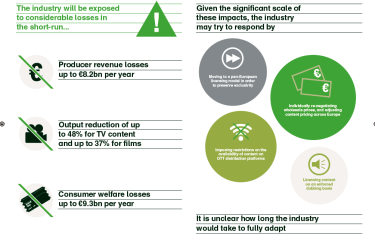The copyright industries haven’t fared particularly well in U.S. trade negotiations recently, missing out on a chance to extend various copyright-protection measures when the Trump administration pulled the U.S. out of the Trans-Pacific Partner, and facing push-back on efforts to incorporate those provisions into a revised NAFTA agreement with Canada and Mexico. But they’re having better luck in Europe and Australia.
 Last week, the Australian government unveiled legislation to extend the current digital safe harbors there to libraries, educational institutions, organizations for the disabled, archives, and other cultural sectors. But in a reversal from a previous government position, the legislation would exclude major commercial platforms like Facebook and Google from such protection.
Last week, the Australian government unveiled legislation to extend the current digital safe harbors there to libraries, educational institutions, organizations for the disabled, archives, and other cultural sectors. But in a reversal from a previous government position, the legislation would exclude major commercial platforms like Facebook and Google from such protection.
Under current Australian law, the safe harbors protecting networks from liability for copyright-infringing materials uploaded by their users is limited to ISPs. Earlier this year, the government floated a proposal to expand those protections to cover a wider range or networks, including commercial services like YouTube that rely heavily on user-generated content. That proposal was shelved in March, however, and the government began a series of consultations with the copyright industries leading up to last week’s announcement.
The change in course represents a major victory for copyright owners, particularly the music industry, which has lobbied heavily for steps to help close the “value gap” it claims the safe harbors have created on social media platforms. Keeping YouTube and Facebook out of those harbors will make it easier for rights owners to negotiate favorable licensing deals with the platforms.
In Europe, meanwhile, the European Parliament voted this week to reject most provisions of the European Commission’s so-called Sat-Cab proposal that would have allowed broadcasters within the European Union to include content they had licensed for broadcast in their own territory in their pan-European digital video-on-demand and over-the-top services.
The proposal by the European Commission was intended to advance the EU’s Digital Single Market initiative but was strongly opposed by the film and TV industries that have long relied on exclusive territory-by-territory licensing to maximize revenue and secure financing for production.
The vote by the European Parliament is not the final step in the EU’s complicated procedures. The proposal now goes to the Council of Ministers made up of senior officials from the member countries, where European broadcasters have vowed to continue pushing for expanded distribution. But for now, the vote in the Parliament is a major victory for the film and TV producers, who lobbied heavily against the commission’s proposal.
That win comes on the heels of a similar victory for rights owners last month, when both the European Parliament and Council agreed to exclude most copyrighted works for at least two years from another provision of the Digital Single Market rules that strictly limits the use of “geo-blocking” measures on digital goods. The elimination of geo-blocking was strongly opposed by book publishers, who feared it would allow online booksellers such as Amazon to sell ebooks throughout the EU with a single license, undercutting the industry’s practice of licensing digital rights territory-by-territory or language-by-language.
As with the Cab-Sat proposal, the agreement on geo-blocking is not the last word on the matter. But for now, at least, the regulatory tide in the EU that had been running strongly against the copyright industries’ long-standing licensing practices appears to be turning.



